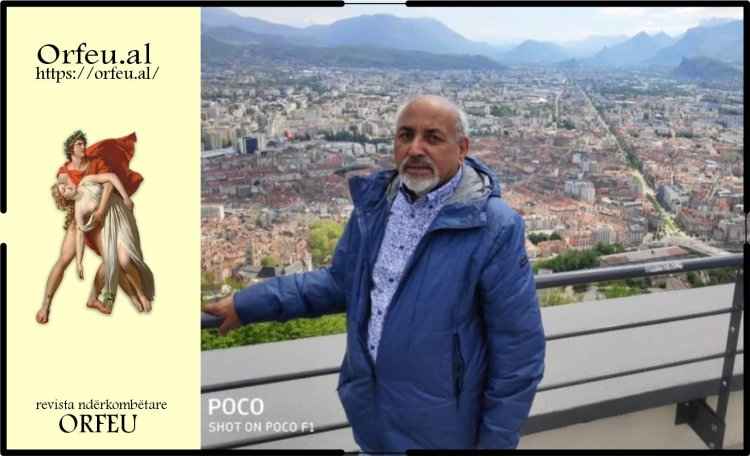ARTICLE BY LALIT MOHAN SHARMA
Dr Lalit Mohan Sharma, born in 1952, has published ten books of English poetry which include 'Man with A Horn', 'Eyes of Silence' and 'There's No Death'. His book, A Three- Step Journey, is English translation of Zahid's Urdu poems. 'Icicles of Time' is the latest in 2024.
Sharma was conferred with 'Master of Creative Impulse' at World Poetry Conference in 2019.
A former Principal, Government College, Dharamshala, he has been anthologised in several books of poetry, stories and such books of academic interest as 21st Century Critical Thought : A Dialogue with Post-Modern Voices Vol I, (2020), A Handbook of Contemporary Ethics, (2024), Ed by Molly Joseph and JS Anand
PARROTS, PATRIOTS AND FULCRUM OF LANGUAGE
Three words, Liberty, Equality and Fraternity, streamed like lightning through not only the French Consciousness but have made a perpetual strike in human consciousness all over the world. Vande Matram fired indian struggle for freedom from the British; so did a phrase like Inquilab Zindabaad from the furnace-like minds of Bhagat Singh to the ordinary foot- soldiers of Indian fight for freedom connecting their endeavour with French and Russian revolutions. Thus parroting noble sentiments has led to rejuvenation of entire peoples. In political terms, the phrase 20- Point Program streamlined india progress during the infamous period of emergency in 1970s, and Modi hai Mumkin hai or Modi Ki Guarantee have been pressed into servicing a purely political agenda with authoritarian streaks as if none but one man can safeguard the country, with no possibility of another alternative. Therein, one cannot but notice the tilt in the fulcrum of language in favour of parroting a cause than walk the noble path of patriotism which a term like Total Revolution did connote when Jaiprakash Narain raised the banner again the ills of emergency declared by Indira Gandhi when her own election to parliament was called to question by a High Court Judge .
Language is a translation of emotions and human feelings. Language serves land and its literature. Parroting could be a less-than- human activity, and patriots through language serve their native land and its literature. With quite a passage of subtlety, the patriotic can sink to the level of parroting; in this, it's language that suffers, and the vocabulary gets tainted with particular meanings, and thus deprived of its flourishing rhythms which can mean more things than proverbially believed. The very words lose their lustre and resonance. One example comes to mind, it's some of the uses to which words like guarantee or mumkin were forced into during the recent parliament elections in 2024. Ironically, it turned into sarcasm. The very party leader needed guarantee (support) of other political parties in order to form the government.
If the percentage of GDP spent on education or health hovers around four percent, both the entities crucial to the strength and prosperity of a country could turn into industries and that obviously in the hands of private owners, catering to the needs of opulent sections of society, the larger number of people are left to suffer and grope for ways to seek health services or good education. The government claims on both these fronts tend to be a case of parroting facilities for the mass of people. And, it would be unpatriotic to disbelieve those official claims. In the process, again, it's language that suffers, failing to correctly express people in authentic terms. The fulcrum is in a suspended state or it sways to suggest an inauthentic state of affairs.
One may wonder if patriotism in a country needs constant parroting of the theme if a country is an established democracy, a country that has enjoyed being free for seventy five years, that it has genuine claims to being special in the comity of nations. None can question India's undisputed credentials as the biggest democracy, an authority in space technology and competence in computers, a good exporter of huge talents in education and health, top industrial barons as its citizens. Yet the trade deficit with some countries can really be disturbing. In order to offset the perception among its own people, certain steps catch the eye. Like, ' Ghar Ghar Tiranga' is a genuinely patriotic drive, and yet, the overdrive in such attempts seems to distract attention from the insistent pressures of unemployment, fuel pricing, rampant inequality, etcetera.
When we talk of the Indian trade deficit, it's indeed a sensitive nerve, and one's language turns uncertain in evaluating its full implications. Bilateral trade deficit with nine of its ten trading partners is a growing cause of concern. That includes China, Russia, Singapore, Korea, etc. The 2023-24 figures for trading with China itself tell the story: exports, USD 16.65 billion; imports, 101.75 dollars. A reasonable rationale can only explain the situation, but can bring no amount of consolation which may satisfy the bubbling ambitions of the common Indian. Fulcrum of language deserves a more desirable solution than mere parroting of facts to a patriotic mind.
Prepared Angela Kosta



